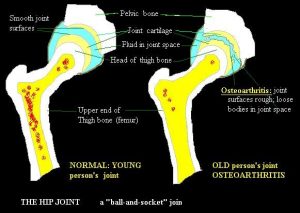Sport Rehabilitation and Physiotherapy for Osteoarthritis of the Hip
What is Osteoarthritis (OA)?
It is the most common type of arthritis. It is a progressive, degenerative condition affecting the smooth cartilage that protects the ends of the bone. This cartilage slowly becomes damaged and worn causing inflammation and pain. The joint space is narrowed and sometimes extra bone called osteophytes can form.
What Causes Osteoarthritis (OA) of the Hip?
The exact reason is not clear but several factors may increase the risks which are: – previous injuries, being overweight, increased age (usually over 50), family history of OA, repeated episodes of Gout or septic arthritis, high impact sports and it is more common in females.
What are the Symptoms of Osteoarthritis (OA) of the Hip?
Pain, limited range of movement, stiffness (worse early morning), swelling, poor mobility and disturbed sleep.
What will treatment consist of for Osteoarthritis (OA) of the Hip?
Massage – Encompassing a variety of techniques with sufficient pressure through the superficial tissue to reach the deep lying structures. It is used to increase blood flow, decrease swelling, reduce muscle spasm and promote normal tissue repair.
Mobilisation – A manual technique where joints and soft tissues are gently moved by the therapist to restore normal range, lubricate tissues and relieve pain.
Ultrasonic Therapy – Transmits sound waves into the tissues stimulating the body’s chemical reactions and healing process, just as shaking a test tube in the laboratory speeds up a chemical reaction. It reduces tissue spasm, accelerates healing and results in pain relief.
Interferential Therapy – Introduces a small electrical current into the tissues and can be used at varying frequencies for differing treatment effects. E.g. pain relief, muscle or nerve stimulation, promoting blood flow and reducing inflammation.
Gait re-education – Will be taught if you are struggling to walk or weight bear through the knee. This may involve using a walking aid which should then allow you to walk normally with reduced symptoms.
What other treatments could be used for Osteoarthritis (OA) of the Hip?
Acupuncture – An oriental technique putting needles into the skin to increase or decrease energy flow promoting pain relief and healing.
Injection Therapy – A specialist procedure during which a non-harmful steroid and local anaesthetic are injected directly into the injured structure. It has a dramatic effect on removing inflammation and promoting healing.
What can you do yourself to help Osteoarthritis (OA) of the Hip?
Exercise programme – This is the most important part of the rehabilitation. Your therapist will instruct you as to which exercises to begin with, when to add the others, as well as how to progress the exercises.
Active Rest – Keep active but avoid aggravating activities particularly weight bearing activities such as running. When having a “good day” do not be tempted to overdo it, likewise on a “bad day” keep active within pain limits.
Apply an ice pack – For a maximum of 20 minutes. A bag of frozen peas wrapped in a damp cloth works well because it moulds to the shape of the tissues. Ensure that you do not apply ice directly to the skin as this can cause an ice burn.
Weight Control – Is important as being overweight puts the hip joints under much greater strain.
Medication – Ask your GP or Pharmacist for advice on the best medication for your condition.
Podiatry – An analysis of the foot mechanics and structure during walking or running and correction as appropriate.
What if physical therapy does not help or resolve Osteoarthritis (OA) of the Hip?
It is very rare that treatment does not resolve this condition. In these cases we would initially recommend injection therapy or we will refer you on for further investigation.
If you think you may have this condition we would love the opportunity to show you our expertise in the treatment and management of this condition so – Please click here for details of how to contact us to book an appointment
If you are unsure whether you have this condition or you would just like to speak to somebody then please get in touch here or call 0161 745 7551 or 0151 515 2323.

